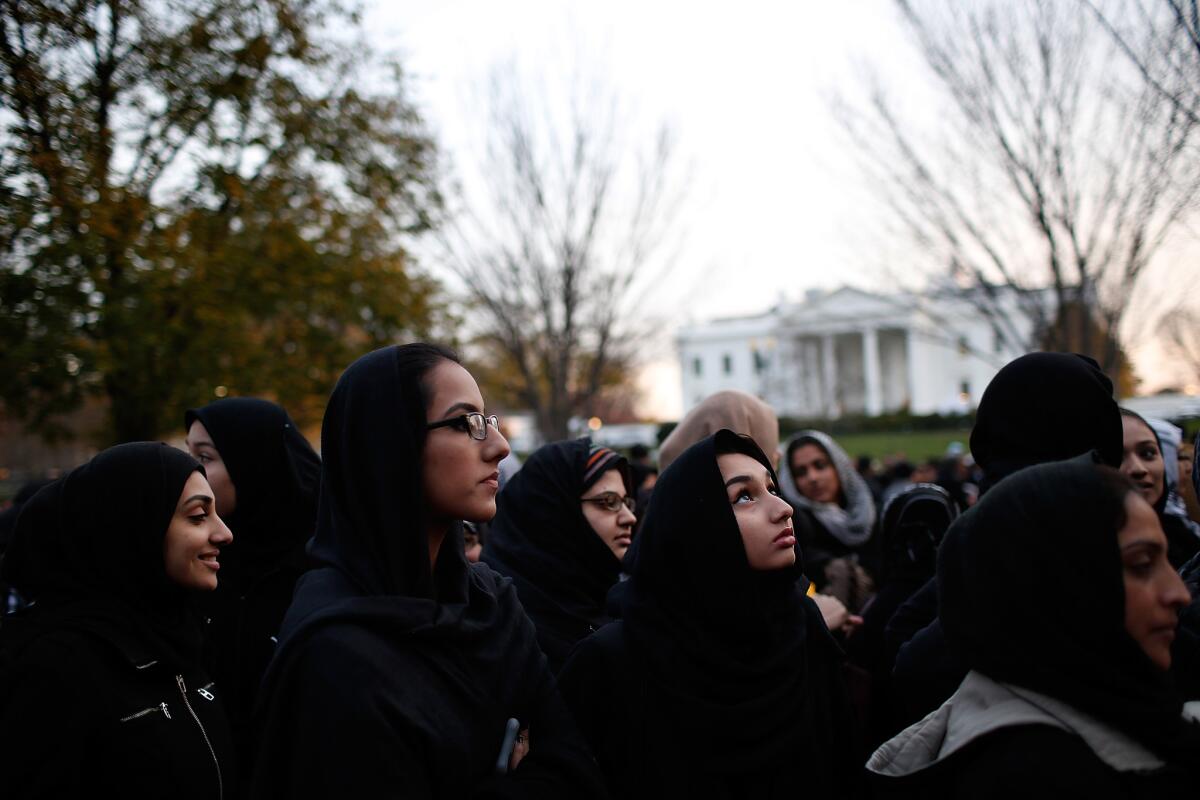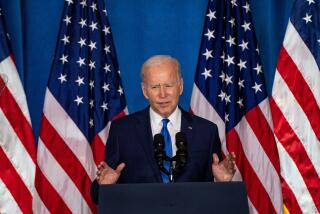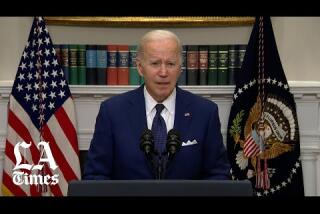Obama seeks to calm Americans on terror threat, but speech underscores challenges

Shiite Muslims demonstrate for peace outside the White House on Sunday, before President Obama was scheduled to address the nation from the Oval Office.
- Share via
Reporting from Washington — President Obama addressed the nation from the Oval Office on Sunday night hoping to reassure anxious Americans that his administration has a strategy to defeat Islamic State overseas, and to protect Americans from the threat of homegrown terrorism.
But the 13-minute speech underscored the magnitude of the challenge and the dearth of options for the White House.
Obama revealed no new ideas or plans for dismantling Islamic State, and he again ruled out sending a large force of U.S. ground troops to fight in the Middle East.
The strategy he did present — more drone strikes, more special forces, more FBI investigations — pointed to a long-term struggle rather than a decisive victory any time soon.
Standing before the oaken Resolute desk, the ultimate bully pulpit, Obama insisted that the U.S.-led military coalition is making progress at whittling away the vast territory Islamic State controls in Iraq and Syria, and at choking off the group’s illicit revenue sources.
But he also acknowledged the group had dramatically expanded its reach in recent weeks by sponsoring or inspiring attacks around the globe, including killing 130 people in Paris, downing a Russian plane over Egypt, shooting up a hotel in Mali, and using suicide bombs in Lebanon, Libya and Yemen.
Obama paid special tribute to the 14 people killed in San Bernardino on Wednesday, noting that the two killers were lured “down the dark path of radicalization.”
“This was an act of terrorism designed to kill innocent people,” he said.
He argued that Islamic State is like no terrorist group in the past. It has drawn about 30,000 foreign fighters, uses encrypted apps and software to avoid detection, and uses social media and the Internet to exhort followers to launch attacks in their home countries.
He described the group as “thugs and killers, part of a cult of death.” He urged Muslims “to decisively and unequivocally reject the hateful ideology.”
But he didn’t assign new resources to address that challenge. He instead offered a defense of his current strategy, suggested modest adjustments to existing programs and called on Congress to pass laws it is unlikely to approve.
Obama said, for example, that he’s ordered the State Department and Homeland Security to review the K-1 visa program, known as the fiance visa, that allowed Pakistani-born Tashfeen Malik — one of the two shooters in San Bernardino — to enter the country in 2014.
He repeated his calls for new gun-control laws since, he said, history has shown that law enforcement “cannot identify every would-be shooter.” But he has urged Congress to pass stiffer gun laws to no avail after every mass killing.
He also urged Congress to draft a new authorization for the use of military force specifically targeting Islamic State. The Pentagon told Congress as recently as Wednesday that it doesn’t need new authorization to go after the group.
Obama also said he would urge tech companies to cooperate more with law enforcement to “make it harder for terrorists to use technology to escape from justice.” Silicon Valley has largely resisted efforts to give the government backdoor access to encryption.
He argued that the success of U.S. efforts to detect or disrupt complicated plots since Sept. 11, 2001, has given rise to the current crop of “less complicated acts of violence,” like the attack in San Bernardino.
“The terrorist threat has evolved into a new phase,” Obama said. White House aides say that the FBI has arrested so many people — at least 56 this year — that the group’s followers have grown more secretive and thus more dangerous.
Obama insisted he is using “every aspect of American power” to battle and ultimately eliminate the group.
“The threat from terrorism is real, but we will overcome it. We will destroy ISIL and any other organization that tries to harm us,” he said, using an acronym for Islamic State.
He added a swipe at his critics: “Our success won’t depend on tough talk, or abandoning our values, or giving in to fear.”
Earlier Sunday, Donald Trump, the front-runner for the Republican presidential nomination, reiterated his call to profile American Muslims.
“I want real vigilance,” he said on CBS’ “Face the Nation,” “whether it’s mosques or whatever it has to be.”
Other Republicans said the president missed an important opportunity to clearly define the threat and retool his strategy.
“We are not winning the war against ISIL, and the threat of terrorism against our homeland is real and growing,” Sen. John McCain (R-Ariz.), chairman of the Armed Services Committee, said in a statement. “As the president said, America should never give in to fear. But neither should we fear to acknowledge the nature and severity of the threats we face and do everything within our power to confront them.”
Obama hasn’t lacked for opportunities recently to try to convince Americans that he has a strategy for beating Islamic State.
Since the Nov. 13 attacks in Paris, the president has spoken with reporters no fewer than 30 times, including at four news conferences where counter-terrorism was a dominant theme.
The president’s decision to speak Sunday night was an acknowledgment that his message was not getting through. He last addressed the nation from the Oval Office five years ago, when he announced his plan to withdraw all U.S. combat troops from Iraq.
In the view of his aides, Obama’s message on terrorism has been drowned out by the heated rhetoric of Republicans vying to replace him next year, and by the president’s own insistence on pressing ahead with other priorities, including global warming and the so-called pivot to Asia.
The calculus changed after the San Bernardino attack, the deadliest terrorist incident on U.S. soil since Sept. 11, 2001.
The president decided late Friday to deliver a major address to “provide the American people with a clear sense of how we need to deal with this threat as a country,” a senior administration official said Sunday.
Follow @mikememoli for more White House coverage.
Times staff writers Lisa Mascaro and W.J. Hennigan contributed to this report.
FULL COVERAGE: Rampage in San Bernardino >>
ALSO
How the San Bernardino attack has reshaped the political debate — and the 2016 election
The White House rushed to correct Obama’s misstatement on visa waivers
Hillary Clinton says tech firms must work to deny ‘virtual territory’ to Islamic State
More to Read
Sign up for Essential California
The most important California stories and recommendations in your inbox every morning.
You may occasionally receive promotional content from the Los Angeles Times.











